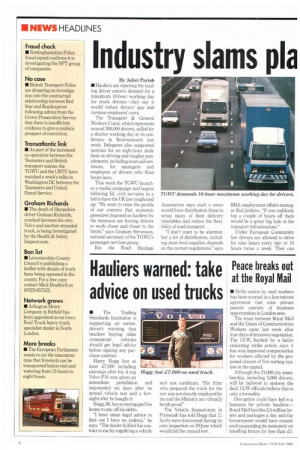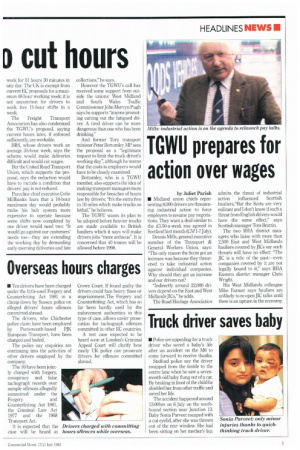Industry sla s pla cut hours
Page 6

Page 7

If you've noticed an error in this article please click here to report it so we can fix it.
• Hauliers are rejecting the leading driver union's demand for a maximum 10-hour working day for truck drivers—they say it would reduce drivers' pay and increase employers costs.
The Transport & General Workers Union, which represents around 300,000 drivers, called for a shorter working day at its conference in Bournemouth last week. Delegates also supported motions for an eight-hour daily limit on driving and tougher punishments, including more jail sentences, for managers and employers of drivers who flout hours laws.
This week the TGWU launches a media campaign and begins lobbying EC civil servants in a bid to have the UK law toughened up: "We want to raise the profile of our concern that economic pressures imposed on hauliers by the recession are forcing drivers to work closer and closer to the limits," says Graham Stevenson, national secretary of the TGWU's passenger services group.
But the Road Haulage Association says such a move would force distribution firms to scrap many of their delivery timetables and reduce the flexibility of road transport.
"I don't want to be alarmist, but a lot of distribution, including most food supplies, depends on the current regulations," says RHA employment affairs manager Rod Jenkins. "If you suddenly lop a couple of hours off there would be a great big hole in the transport infrastructure."
Under European Community law drivers are allowed to drive for nine hours every day or 10 hours twice a week. They can work for 11 hours 30 minutes in any day The UK is exempt from current EC proposals for a maximum 48-hour working week: it is not uncommon for drivers to work five 11-hour shifts in a week.
The Freight Transport Association has also condemned the TGWU's proposal, saying current hours laws, if enforced sufficiently, are workable.
BRS, whose drivers work an average 55-hour week, says the scheme would make deliveries difficult and would cut wages.
But the United Road Transport Union, which supports the proposal, says the reduction would have to include a condition that drivers' pay is not reduced.
Parceline chief executive Colin Millbanks fears that a 10-hour maximum day would probably make his hub system more expensive to operate because some shifts now completed by one driver would need two: "It would go against our customers' needs too—they are extending the working day by demanding early-morning deliveries and late However the TGWU's call has received some support from outside the unions: West Midland and South Wales Traffic Commissioner John Mervyn Pugh says he supports "anyone promoting cutting out the fatigued driver. A tired driver can be more dangerous than one who has been drinking."
And former Tory transport minister Peter Bottomley MP sees the proposal as a "legitimate request to limit the truck driver's working day", although he warns that the costs to employers would have to be closely examined.
Bottomley, who is a TGWU member, also supports the idea of making transport managers more responsible for breaches of hours law by drivers: "It's the extra five to 10 miles which make trucks so lethal," he believes.
The TGWU wants its plan to be adopted before heavier trucks are made available to British hauliers which it says will make drivers jobs "more arduous". It is concerned that 40 tonnes will be allowed before 1998.




















































































